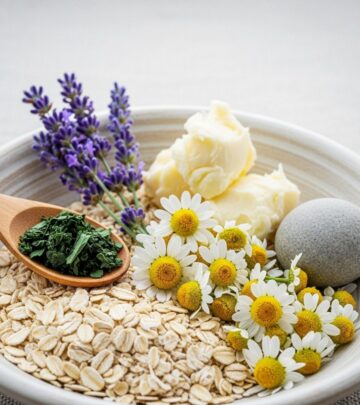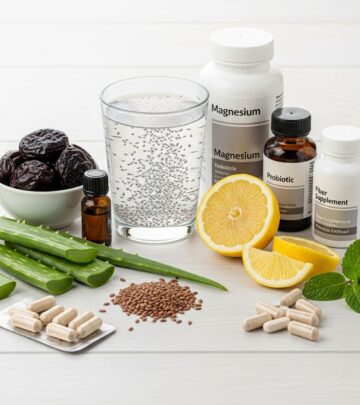GERD: Symptoms, Causes, Natural Remedies & Reflux Diet Guide
Complete guide to managing GERD naturally with proven remedies and diet

Gastroesophageal reflux disease (GERD) is a chronic digestive condition that affects millions of people worldwide, causing discomfort and potentially serious complications if left untreated. This comprehensive guide explores the symptoms, underlying causes, natural home remedies, and dietary modifications that can help manage this challenging condition effectively.
Understanding Gastroesophageal Reflux Disease (GERD)
GERD occurs when stomach contents, including acid, flow backward into the esophagus, the muscular tube connecting your mouth to your stomach. This happens when the lower esophageal sphincter (LES), a ring of muscle at the bottom of the esophagus, doesn’t close properly or relaxes inappropriately. While occasional acid reflux is normal and experienced by many people after meals, GERD represents a chronic condition where this reflux occurs frequently enough to cause troublesome symptoms or damage to the esophageal lining.
The condition is remarkably common, affecting approximately 20% of adults and 10% of children in the United States. GERD is considered present when you experience acid reflux at least twice a week for several weeks, distinguishing it from occasional heartburn that most people experience from time to time.
Common Symptoms of GERD
The hallmark symptom of GERD is heartburn, described by patients as a burning sensation behind the breastbone in the chest that may radiate toward the neck and throat. This uncomfortable feeling typically worsens after eating, when lying down, or when bending over. However, GERD manifests through various symptoms beyond just heartburn.
Regurgitation is another typical symptom, where stomach contents or sour liquid flows back into the mouth, leaving an unpleasant taste. Many patients also experience chest pain that can sometimes be mistaken for cardiac issues, difficulty or pain when swallowing (dysphagia), and the sensation of food sticking in the esophagus.
Extra-esophageal manifestations, or symptoms occurring outside the esophagus, include chronic cough, hoarseness, throat clearing, chronic sore throat, wheezing, and the feeling of a lump or foreign body stuck in the throat. Some individuals experience epigastric pain (discomfort in the area below the ribs and center of the upper abdomen), sleep disturbances, and dental erosion from repeated acid exposure.
What Causes GERD?
GERD doesn’t have a single identifiable cause but rather results from multiple factors that compromise the barrier between the stomach and esophagus. Understanding these contributing factors is essential for effective management.
Obesity is one of the most significant risk factors. Extra weight, particularly around the abdomen, increases pressure on the stomach, making it easier for acid to back up into the esophagus. The mechanical pressure created by excess abdominal fat can overwhelm the LES’s ability to stay closed.
Pregnancy commonly triggers GERD through two mechanisms: hormonal changes that relax the LES and the physical pressure of the growing uterus on the stomach. Many pregnant women experience reflux symptoms, particularly in the later stages of pregnancy.
Smoking weakens the LES function, increases stomach acid production, reduces saliva production (which normally helps neutralize acid), and impairs muscle reflexes in the throat. These combined effects make smokers particularly vulnerable to GERD.
Certain medications can contribute to GERD by relaxing the LES or irritating the esophagus. These include some painkillers, antihistamines, calcium channel blockers, sedatives, and antidepressants. If you’re taking medications and experiencing reflux symptoms, consult your healthcare provider about potential alternatives.
A hiatal hernia, where part of the stomach pushes up through the diaphragm, disrupts the normal anatomy and can contribute to GERD development. Additionally, delayed stomach emptying (gastroparesis) allows stomach contents more time to reflux into the esophagus.
Types of GERD
Medical professionals classify GERD into three distinct subtypes based on the extent of esophageal damage:
Non-erosive reflux disease (NERD) is the most common subtype, characterized by troublesome reflux symptoms but without visible damage to the esophageal lining during endoscopy. Despite the absence of erosions, patients with NERD experience significant symptom burden and reduced quality of life.
Erosive reflux disease (ERD) involves visible damage to the esophageal mucosa (the protective lining) observable during endoscopic examination. The severity ranges from mild inflammation to severe ulceration.
Barrett’s esophagus represents the most serious complication, where chronic acid exposure causes the normal esophageal lining to be replaced with tissue resembling the stomach or intestinal lining. This condition increases the risk of developing esophageal adenocarcinoma, a type of esophageal cancer, making regular monitoring essential.
Natural Home Remedies for GERD
Many people successfully manage GERD symptoms through natural remedies and lifestyle modifications. While these approaches may not replace medical treatment for severe cases, they offer effective relief for mild to moderate symptoms and can complement conventional therapies.
Dietary and Eating Habit Modifications
Eat smaller, more frequent meals rather than three large meals. Smaller portions reduce stomach distension and pressure on the LES, minimizing reflux episodes. Aim for five to six smaller meals throughout the day.
Avoid late-night eating by finishing your last meal at least three hours before bedtime. This allows time for stomach contents to empty before lying down, when gravity no longer helps keep acid in the stomach.
Chew food thoroughly and eat slowly. Proper chewing initiates digestion and reduces the workload on your stomach, promoting more efficient emptying and reducing reflux risk.
Stay upright after eating for at least two to three hours. Gravity assists in keeping stomach contents where they belong. Avoid lying down or bending over immediately after meals.
Herbal and Natural Supplements
Ginger has natural anti-inflammatory properties and helps with digestion. Consume fresh ginger tea by steeping sliced ginger root in hot water, or incorporate small amounts of fresh ginger into meals.
Chamomile tea soothes the digestive tract and may reduce inflammation. Drinking a cup of chamomile tea 30 minutes before bed can help calm the stomach and promote better sleep.
Licorice root, particularly deglycyrrhizinated licorice (DGL), may help protect the esophageal lining. Take DGL supplements as directed, typically before meals.
Aloe vera juice can help soothe and reduce inflammation in the esophagus. Drink a quarter cup of pure aloe vera juice about 20 minutes before meals, but start with small amounts as it can have a laxative effect.
Apple cider vinegar, though acidic, may help some people by improving digestion. Mix one to two tablespoons in a glass of water and drink before meals. However, this remedy doesn’t work for everyone and may worsen symptoms in some individuals.
Positional and Physical Remedies
Elevate the head of your bed by six to eight inches using bed risers or a wedge pillow. This elevation uses gravity to help prevent acid from flowing back into the esophagus during sleep. Avoid simply stacking regular pillows, as this can create uncomfortable bending at the waist.
Sleep on your left side. Research suggests that left-side sleeping reduces reflux episodes because of the stomach’s anatomical position. The stomach sits lower than the esophageal opening when you lie on your left side.
Maintain proper posture throughout the day. Slouching or hunching increases abdominal pressure and can trigger reflux. Sit and stand with your back straight and shoulders back.
Wear loose-fitting clothing, especially around the waist and abdomen. Tight belts, waistbands, and restrictive clothing increase pressure on the stomach, promoting reflux.
Lifestyle Modifications
Achieve and maintain a healthy weight. Even modest weight loss of 10-15 pounds can significantly improve GERD symptoms in overweight individuals. Focus on gradual, sustainable weight loss through balanced nutrition and regular physical activity.
Quit smoking immediately. Smoking cessation is one of the most important steps you can take to improve GERD symptoms. The benefits begin almost immediately and continue to improve over time.
Manage stress effectively. Chronic stress can worsen GERD symptoms by affecting digestion and increasing stomach acid production. Practice stress-reduction techniques like meditation, deep breathing exercises, yoga, or progressive muscle relaxation.
Exercise regularly, but choose the right timing and type. Moderate exercise like walking, swimming, or cycling can help with weight management and stress reduction. However, avoid vigorous exercise immediately after eating, and be cautious with activities involving bending or inverting the body.
Natural Acid Neutralizers
Chew sugar-free gum after meals. This stimulates saliva production, which helps neutralize stomach acid and wash it back down into the stomach. Opt for non-mint flavors, as mint can relax the LES.
Drink water strategically. Sipping water throughout the day helps dilute stomach acid and wash it back down. However, avoid drinking large amounts during meals, as this can distend the stomach.
Try baking soda (sodium bicarbonate) as an occasional remedy. Mix one-half teaspoon in a glass of water for quick relief. However, don’t use this regularly due to its high sodium content and potential side effects.
Consume bananas, which act as natural antacids. Their high potassium content may help neutralize stomach acid. Ripe bananas work best for most people.
Eat raw almonds, which may help neutralize stomach acid due to their oil content. Chew a handful of raw almonds slowly when you feel symptoms coming on.
Additional Natural Approaches
Slippery elm creates a protective coating in the esophagus. Take slippery elm lozenges or mix powdered slippery elm bark with water to create a soothing drink.
Fennel seeds can help reduce stomach acid and improve digestion. Chew a teaspoon of fennel seeds after meals or steep them in hot water for tea.
Mustard, despite being acidic, may help neutralize stomach acid due to its alkaline properties. Take a teaspoon of yellow mustard when experiencing symptoms.
Papaya contains the enzyme papain, which aids digestion. Eat fresh papaya or take papaya enzyme supplements with meals.
Pineapple contains bromelain, an enzyme that helps with protein digestion. Consume fresh pineapple (not canned) after meals to aid digestion.
The GERD-Friendly Reflux Diet
Dietary modification is one of the most effective ways to manage GERD symptoms. Understanding which foods to embrace and which to avoid can dramatically improve your quality of life.
Foods to Include
Lean proteins such as skinless chicken, turkey, fish, and egg whites are well-tolerated and don’t trigger reflux. Bake, broil, or grill these proteins rather than frying them.
Non-citrus fruits including melons, bananas, apples, and pears are generally safe choices. These fruits are less acidic and less likely to trigger symptoms.
Vegetables, particularly green vegetables like broccoli, asparagus, green beans, celery, and leafy greens, should form the foundation of your diet. Root vegetables like potatoes, carrots, and beets are also excellent choices.
Whole grains such as oatmeal, brown rice, quinoa, and whole-grain bread provide fiber and don’t trigger reflux. The fiber helps with digestion and may reduce symptoms.
Healthy fats in moderation, including avocados, nuts (except those that trigger your symptoms), and olive oil, can be incorporated carefully. While fat can trigger symptoms in some people, these sources are generally better tolerated than saturated fats.
Ginger and herbs like parsley, basil, and oregano can add flavor without triggering symptoms. Fresh ginger especially can help soothe the digestive system.
Foods to Avoid or Limit
Acidic foods and beverages including citrus fruits (oranges, lemons, grapefruits), tomatoes and tomato-based products, and citrus juices directly irritate the esophageal lining and should be minimized or eliminated.
High-fat foods such as fried foods, fatty cuts of meat, full-fat dairy products, and rich desserts slow stomach emptying and relax the LES, promoting reflux. These should be strictly limited.
Chocolate contains compounds that relax the LES and is also high in fat. Many GERD sufferers find chocolate to be a significant trigger.
Mint, including peppermint and spearmint, relaxes the LES despite being soothing to other digestive issues. Avoid mint-flavored foods, candies, and teas.
Spicy foods containing hot peppers, chili powder, curry, and other spices can irritate the esophagus and worsen symptoms in many people.
Caffeinated beverages including coffee, tea, and energy drinks stimulate acid production and can relax the LES. If you can’t eliminate caffeine completely, limit intake and avoid it on an empty stomach.
Carbonated beverages cause stomach distension, increasing pressure and promoting reflux. This includes soda, sparkling water, and beer.
Alcohol relaxes the LES, increases stomach acid production, and irritates the esophageal lining. Red wine and beer are particularly problematic for many people.
Onions and garlic, especially raw, trigger symptoms in many GERD sufferers. Cooked versions may be better tolerated in small amounts.
Creating Your Personalized Reflux Diet
Keep a detailed food diary to identify your personal triggers. Everyone’s tolerances differ, so what bothers one person may not affect another. Record everything you eat and drink, along with any symptoms, their severity, and timing. After several weeks, patterns will emerge showing which foods consistently cause problems.
Implement an elimination diet by removing common trigger foods for two to three weeks, then reintroducing them one at a time to identify specific culprits. This systematic approach provides clear answers about your individual triggers.
Plan balanced meals that include lean proteins, complex carbohydrates, and plenty of vegetables. Use cooking methods like baking, grilling, steaming, or broiling rather than frying. Season foods with herbs and mild spices that don’t trigger your symptoms.
Medical Treatment Options
While natural remedies and dietary changes are highly effective for many people, some cases require medical intervention. Understanding available treatments helps you work effectively with your healthcare provider.
Antacids provide quick, short-term relief by neutralizing stomach acid. Over-the-counter options include calcium carbonate and magnesium hydroxide products. These work within minutes but last only a few hours.
H2 receptor blockers (H2RAs) reduce acid production and provide longer-lasting relief than antacids. Examples include famotidine and cimetidine. These medications take longer to work but last up to 12 hours.
Proton pump inhibitors (PPIs) are the most effective medications for reducing stomach acid production. They block the enzyme system responsible for acid secretion. Common PPIs include omeprazole, esomeprazole, and lansoprazole. These require daily use and work best when taken before meals.
Prokinetic agents help strengthen the LES and improve stomach emptying, reducing the opportunity for reflux. However, these medications have more potential side effects and are typically reserved for cases not responding to other treatments.
For severe cases not responding to medication, surgical options like fundoplication (wrapping the top of the stomach around the LES) or LINX device placement (a ring of magnetic beads around the LES) may be considered.
When to See a Doctor
While many people manage GERD successfully with lifestyle modifications and over-the-counter treatments, certain symptoms require medical attention. Consult your healthcare provider if you experience heartburn two or more times per week, symptoms that worsen despite treatment, heartburn that wakes you from sleep, symptoms persisting for several years, difficulty or pain when swallowing, or if discomfort interferes with daily activities.
Seek immediate medical attention for severe chest pain (especially if accompanied by shortness of breath, arm pain, or dizziness), difficulty swallowing that worsens, persistent vomiting, or unexplained weight loss. These could indicate serious complications or other conditions requiring urgent evaluation.
Complications of Untreated GERD
Chronic GERD can lead to serious complications if left untreated. Esophagitis, inflammation of the esophageal lining, causes pain and difficulty swallowing. Esophageal stricture occurs when repeated acid exposure causes scarring and narrowing of the esophagus, making swallowing increasingly difficult.
Barrett’s esophagus develops in approximately 10% of long-term GERD patients and increases the risk of esophageal cancer. Regular monitoring through endoscopy is essential for those with this condition. Respiratory problems can occur when acid reaches the throat and airways, potentially causing asthma, chronic cough, laryngitis, and pneumonia.
Dental erosion results from repeated acid exposure, damaging tooth enamel and increasing cavity risk. GERD sufferers should maintain excellent dental hygiene and inform their dentist about their condition.
Living Successfully with GERD
GERD is a chronic condition requiring ongoing management, but with the right approach, most people achieve excellent symptom control and maintain a high quality of life. Success comes from combining multiple strategies: dietary modifications, lifestyle changes, natural remedies, and medical treatment when necessary.
Be patient with yourself as you identify triggers and find what works best. What succeeds for one person may not work for another, so personalization is key. Work closely with your healthcare provider to develop an individualized treatment plan, and don’t hesitate to seek help when symptoms persist or worsen.
Remember that consistency matters more than perfection. Small, sustainable changes maintained over time produce better results than drastic measures you can’t maintain. Focus on progress rather than perfection, and celebrate improvements along the way.
Frequently Asked Questions
Q: Can GERD be cured permanently?
A: GERD is typically a chronic condition that requires ongoing management rather than a one-time cure. However, many people achieve complete symptom relief through consistent lifestyle modifications, dietary changes, and appropriate medical treatment. Some individuals, particularly those whose GERD is triggered by temporary factors like pregnancy or certain medications, may experience complete resolution once those factors are addressed.
Q: How long does it take for natural remedies to work for GERD?
A: The timeline varies depending on the remedy and individual. Some interventions like elevating the head of your bed or avoiding trigger foods can provide relief within days, while others like weight loss or stress management may take weeks to months to show significant improvement. Most people notice some improvement within two to four weeks of consistently implementing multiple natural remedies and dietary changes.
Q: Is it safe to take PPIs long-term?
A: While PPIs are generally safe and effective, long-term use (especially at high doses) has been associated with potential risks including vitamin B12 deficiency, magnesium deficiency, increased bone fracture risk, and possible increased risk of infections. These risks should be discussed with your healthcare provider, who can help determine the appropriate duration and dosage. Many people can eventually reduce or discontinue PPIs once lifestyle modifications and dietary changes are in place.
Q: Can stress cause GERD?
A: While stress doesn’t directly cause GERD, it can worsen symptoms by affecting digestion, increasing stomach acid production, and making you more sensitive to pain. Stress may also lead to behaviors that trigger GERD, such as overeating, eating trigger foods, or consuming more alcohol and caffeine. Managing stress through relaxation techniques, exercise, and adequate sleep can help reduce GERD symptoms.
Q: Are there any exercises that can help with GERD?
A: Moderate-intensity exercises like walking, cycling, and swimming can help with weight management and stress reduction, both beneficial for GERD. However, avoid high-impact exercises, inverted yoga poses, and vigorous workouts immediately after eating. Breathing exercises and gentle stretching that doesn’t compress the abdomen can also be helpful. Always wait at least two to three hours after eating before exercising.
Q: Can children have GERD?
A: Yes, children can develop GERD, though it’s less common than in adults. Infants may spit up frequently, but true GERD causes distress, feeding difficulties, poor weight gain, and respiratory problems. In older children, symptoms mirror those in adults. Pediatric GERD requires evaluation and management by a pediatrician or pediatric gastroenterologist, as treatment approaches may differ from adult protocols.
Q: Does drinking water help with acid reflux?
A: Drinking water can help by diluting stomach acid and washing it back down into the stomach. Sipping water throughout the day is beneficial. However, drinking large amounts during meals can distend the stomach and potentially worsen reflux. Room temperature or slightly warm water is generally better tolerated than very cold water.
Q: What is the best sleeping position for GERD?
A: The best sleeping position is on your left side with the head of your bed elevated six to eight inches. Left-side sleeping takes advantage of the stomach’s anatomy to reduce reflux episodes. Elevation uses gravity to help keep stomach contents where they belong. Avoid sleeping on your right side or stomach, as these positions can worsen symptoms.
References
- https://iffgd.org/wp-content/uploads/IFFGD_GERD_Reporters_Guide.pdf
- https://www.gastromedclinic.com/comprehensive-guide-to-managing-gerd-effective-treatments-and-lifestyle-changes-for-lasting-relief/
- https://my.clevelandclinic.org/health/diseases/17019-acid-reflux-gerd
- https://pmc.ncbi.nlm.nih.gov/articles/PMC8754510/
- https://www.mayoclinic.org/diseases-conditions/gerd/symptoms-causes/syc-20361940
- https://www.mskcc.org/cancer-care/patient-education/gastroesophageal-reflux-disease-gerd
- https://www.bumrungrad.com/en/health-blog/may-2025/2025-american-guidelines-for-gerd-a-complete-patient-guide
- https://www.mayoclinic.org/diseases-conditions/gerd/diagnosis-treatment/drc-20361959
Read full bio of Sneha Tete












